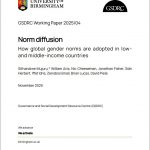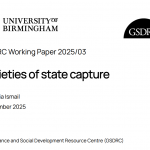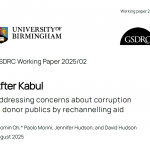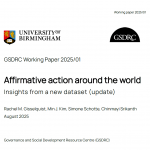Sithandiwe Mujuru,* William Avis, Nic Cheeseman, Jonathan Fisher, Siân Herbert, Iffat Idris, Zenobia Ismail, Brian Lucas, and David Piela Abstract: As countries move towards achieving the gender equality targets of the 2030 Agenda for Sustainable Development, improving the rigour, relevance, and practical value of evidence on gender norm change is increasingly important. ...» more
Varieties of state capture
Zenobia Ismail Abstract: The literature on state capture is growing and encompasses more countries and contexts. This paper argues that it is time to consider varieties of capture that have different trajectories and outcomes. Two factors, the level of democracy and the strength of institutions, are proposed as starting points for thinking about varieties of capture. Using ...» more
After Kabul: Addressing concerns about corruption in donor publics by rechannelling aid
Soomin Oh, Paolo Morini, Jennifer Hudson, and David Hudson Abstract: Donor governments face the challenge of securing public support when providing aid, especially to countries ruled by unsavoury regimes or with high levels of corruption — countries that also face the most urgent development and humanitarian challenges. What shapes public opinion towards development ...» more
Affirmative action around the world Insights from a new dataset (update)
Rachel M. Gisselquist, Min J. Kim, Simone Schotte, and Chinmayi Srikanth Abstract: Affirmative action (or ‘positive action’) measures have been adopted in dozens of countries around the world as a means of addressing group-based inequalities in educational enrolment, employment, political representation, and other areas. Although there is a large research literature on ...» more




